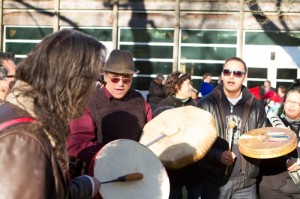A red blanket adorned with traditional symbols draped over her shoulders, Shelly Johnson took the mic in front of the UBC First Nations Longhouse on the afternoon of January 3 and began verbally assailing Bill C-45, a sweeping new law from Prime Minister Stephen Harper’s government.
“We can all do something about this colonial and unilateral, paternalistic legislation being pushed through in the name of Canada,” said Johnson, an assistant professor in the UBC School of Social Work and a Saulteaux person from the Keeseekoose First Nation in Saskatchewan. The roughly 200 Idle No More supporters gathered on the lawn cheered.
Idle No More is a viral, decentralized protest movement founded weeks ago by Canadian aboriginal activists. It sparked over a hunger strike by Theresa Spence, chief of the Attawapiskat First Nation in Northern Ontario, who has now gone three weeks on a liquid diet in hopes of meeting with Harper to discuss treaty rights. The movement grew across Canada to a series of increasingly vehement demonstrations opposing C-45, a law that changes how aboriginal reserve land in Canada can be sold.
The January 3 event, organized by Johnson, was the movement’s first on the UBC campus. It featured speakers including Joyce Murray, MP for VancouverŃQuadra and candidate for leader of the Liberal Party of Canada, as well as Grand Chief Stewart Phillip, president of the Union of BC Indian Chiefs.

Those assembled were low-key and solemn. Quiet, scattered applause was punctuated by occasional drumbeats. The speakers had angry and determined messages, but spoke in a somber tone. During a lull waiting for Grand Chief Phillip to arrive, a dance circle began, one lively moment that drew in most of the crowd.
The speakers criticized the Harper government and praised the movement for highlighting issues that have long plagued aboriginal peoples and Canada as a whole.
Murray, who first announced her support for Idle No More weeks ago, said Bill C-45 demonstrates larger problems with the current government. “It has been a very difficult time, to see the downward spiral of democracy, the closed-ness, but also the lack of consultation and especially the lack of consultation with aboriginal peoples,” she said.
Proponents of the bill say it will help aboriginal groups pursue economic development projects on their land. But the Idle No More organizers say the bill violates existing treaties. Specifically, many are worried that by allowing the minister for Indian affairs to sell reserve land without a band’s consent, the government is hoping to open more land to oil drilling.
Tom Flanagan, a political science professor at the University of Calgary and former Harper adviser who supports the bill, says aboriginal groups oppose it simply because they believe the federal government lacks authority to change how aboriginal land is managed. Phillip said the Idle No More movement has brought out a side of aboriginal issues the media had previously failed to focus on.
“The only way the public is going to really understand the depth of poverty, and the tragic dimensions of that poverty, is when you hear from the people themselves who are most affected by the poverty,” said Grand Chief Phillip. “The Idle No More movement goes beyond the indigenous communityÉ. [Harper’s government] has shown utter contempt for the parliamentary process and I believe Canadians are beginning to wake up to this.”
Shawn Schaubel, a UBC social work student who collected signatures in opposition of C-45, thought the demonstration achieved an important goal: raising more awareness for aboriginal issues.
“I don’t think a lot of people on campus either know about Idle No More, or people think it’s only about aboriginal issues,” said Schaubel. “The average person doesn’t know what it’s about.”
